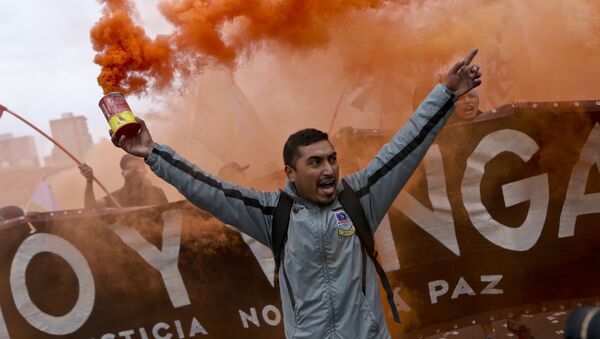For obvious though lamentable reasons this is the 9/11 anniversary that hardly makes the news, dwarfed by its more infamous counterpart, the terrorist attack unleashed against the United States in 2001.
However the significance of the fascist coup in Chile in 1973 cannot be overstated, as here ensued the world's first experiment in that mass experiment in human despair more commonly known as neoliberalism. This free market economic doctrine was the brainchild of US economist Milton Friedman, developing it along with his disciples at the notorious school of economics at the University of Chicago in the 1960s and 1970s, which he headed.
Friedman, who died in 2006, was and is still considered a genius on the right of the political spectrum, his doctrine embraced by various right wing leaders and governments from the 1970s to the present day. The likes of the aforementioned Augusto Pinochet, along with Ronald Reagan, Margaret Thatcher and Boris Yeltsin, embraced Friedman's ideas and applied it them their respective countries with disastrous results for the working class and the poor of each.
In essence the most extreme, deregulated model of capitalism ever devised, neoliberalism changed the role of the economy from a servant of society to a tyrant ruling over it. Indeed it is an economic system and doctrine so extreme it requires a major economic and/or social convulsion — in other words a shock — to enable it to be applied with the minimum of resistance.
Thus we have the coup in Chile on 11 September 1973.
Exploring the aftermath of the coup in Chile in her peerless work, The Shock Doctrine, Canadian journalist Naomi Klein reveals, "For the first year and a half, Pinochet faithfully followed the Chicago [School] rules." As a result, she goes on,
"In 1974 inflation reached 375 percent — the highest rate in the world…The cost of basics such as bread went through the roof. At the same time, Chileans were being thrown out of work because Pinochet's experiment with ‘free trade' was flooding the country with cheap imports."
Salvador Allende, a Marxist intellectual and physician, by the time of his election as president in 1970 had been involved in Chilean politics for forty years, in which time he served as a senator, deputy and cabinet minister. He had also stood for the presidency three times and lost. His program for government was avowedly socialist — i.e. the nationalization of key industries, specifically copper, land reform, the introduction of healthcare, and redistribution of the nation's wealth and income to the benefit of the workers responsible for creating it.
In his maiden speech to the Chilean Parliament as the nation's president, Allende said:
"This is an unprecedented time, which offers us the material means of realizing the most generous Utopian dreams of the past. The only thing that prevents our achieving this is the heritage of greed, of fear and of obsolete institutional traditions. Between our time and that of the liberation of man on a planetary scale, this inheritance has to be overcome. Only in this way will it be possible to call upon men to reconstruct their lives, not as products of a past of slavery and exploitation, but in the most conscious realization of their noblest potentialities. This is the socialist ideal."
However just as the Cuban people have experienced in their history, and as the people of Venezuela are experiencing now, there is nothing more powerful than the wrath of Washington-backed economic interests and oligarchs wherever and whenever socialist governments dare emerge in Latin America to challenge the right of the rich and business interests to rule.
The US president in 1970 was Richard Nixon, who in response to Allende's election promised to "make the [Chilean] economy scream," instructing the CIA to start working to undermine the country in order to pave the way for a military takeover. At the time US business interests in Chile were extensive, especially in the copper mining industry in which two US corporations, Anaconda and Kennicott, were major players.
Even more important than those US business interests, however, was Washington's foreign policy priority of containing socialism and communism — a priority measured in its commitment to the War in Vietnam, thousands of miles from its own borders, at that time. When it came to its ‘own backyard' in Latin America, where the Cuban Revolution of 1959 had inspired and catalysed socialism across the region, Washington's determination to crush the ‘red menace' was especially fierce.
Nixon's Secretary of State (foreign secretary) was Henry Kissinger, a man with enough blood on his hands to have a river named after it. Of Allende's election in Chile in 1970, he said:
"I don't see why we need to stand by and watch a country go communist due to the irresponsibility of its people. The issues are much too important for the Chilean voters to be left to decide for themselves."
Allende chose not to heed the advice of his friend and comrade, Cuba's Fidel Castro, to arm the workers, having warned him against placing too much trust in his country's military high command. It was a decision that would cost him his life. Having refused the offer of safe passage and exile from the country when the coup began, Allende shot himself rather than be taken alive.
In his farewell address, broadcast to the nation and the world over the radio with the sound of gunfire clearly discernible in the background, Allende said, "In this definitive moment, the last thing which I can say to you is that I hope you will learn this lesson: foreign capital, imperialism united with reaction, created the climate for the armed forces to break with their tradition… these are my last words. I am sure that my sacrifice will not be in vain; I am sure that it will at least be a moral lesson which will punish felony, cowardice and treason."
Upon coming to power, General Pinochet unleashed a wave of terror and murder that none who witnessed it would ever forget. And yet right up the end of his life, Pinochet enjoyed the protection and support of the likes of former British Prime Minister Margaret Thatcher, darling of the right and like Pinochet a passionate champion of neoliberalism.
This article is dedicated to its countless victims.
The views expressed in this article are solely those of the author and do not necessarily reflect the official position of Sputnik.
Check out John's Sputnik radio show, Hard Facts.




